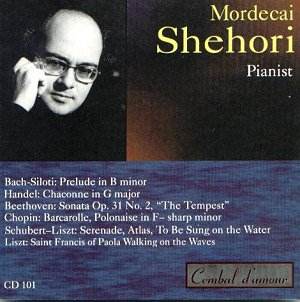Mordecai Shehori, whose praises I have sung on this
site before, both as executant and disseminator of discs, recorded
this album back in 1994. It conforms to the repertoire of a Romantic
par excellence. It makes for a pleasing recital, both in its scope
(intellectual, historical, technical) and in its sensitive and
bravura musicianship. This in turn demonstrates Shehori’s acute
ear for telling and revealing juxtaposition. Indeed one is aware
at all times of his consistently superior talents in this direction,
of a probing mind and cast iron technique working in synchronous
harmony.
His Romantic affiliations are immediately nailed
to the mast in the first two selections, the hyphenated Bach-Siloti
and the Handel Chaconne. The delicate tracery of the former, its
liquidity and Old School pliancy, are marvellous to hear. Shehori
is unashamed, quite rightly, of the deeply expressive and pedalled
halo he conjures from the Steinway once belonging to Josef Hofmann.
He succeeds triumphantly in conveying its refashioned intimacies.
The Handel, similarly, is something of a triumph. The immaculately
humorous voicings, the clarity, the non-staccato left hand, the
chordal weight, his unwillingness simply to rush and the perfectly
developed internally galvanic rhythm are all notable features
of this performance. The D minor Sonata (The Tempest) is
the centre point of the recital. It’s a work well suited to
Shehori’s volatile but controlled sensitivity. He is generous
with the pedal in his opening statements, the contrastive sections
brittle without hardening, and the middle voices perfectly audible
(but not over-promoted). His is not the way of Schnabel’s granitic
grandeur or of, say, Kempff’s sometimes discursive accenting.
Shehori is cooler but deeply engaged. He brings considerable introspective
depth to the first movement at a relatively slow tempo, quite
without ostentation. The Adagio is again marshalled with no little
understanding. There is clarity once more and I sense he seeks
at all times to cohere the movement, to draw together its quixotic
character rather than to fracture it still further. To this extent
he is the architect-poet. Those who object to or dislike the performance
will point to what they take to be a certain disengagement but
I prefer to see Shehori as that rara avis, the intellectual-romantic.
That he can be protean in his colouristic power can easily be
demonstrated by the Allegretto. There is poetry and nuance here.
He just chooses to unleash them at the most apposite time.
His Chopin is, as one would expect, both expressive
and strong. His tonal cultivation in the Barcarolle is
delightful where once more he refuses to rush for merely superficial
effect. Dynamic contrasts are observed with care, his trills are
effortless, the rise and fall of the line conveying genuine tension
and not a little elegance too. I quite liked his tempo retardation
at 6.39 – humorous – and he sweeps to a genuinely musical conclusion.
The Schubert-Liszt transcriptions are made for Shehori, whether
delicate in Ständchen or leonine and dramatic in Der
Atlas. And in the final piece, Liszt’s own A Legend; Saint
Francis of Paola walking on the Waves he is appositely dashing
and daring with a coda of considerable beauty.
A splendid recital then in every way and one
that I think must reflect Shehori’s concert recitals. If they
are as good as this disc New York concertgoers are spoiled for
choice.
Jonathan Woolf

![]() Mordecai Shehori (piano)
Mordecai Shehori (piano)
![]() CEMBAL D’AMOUR CD 101
[77.09]
CEMBAL D’AMOUR CD 101
[77.09]